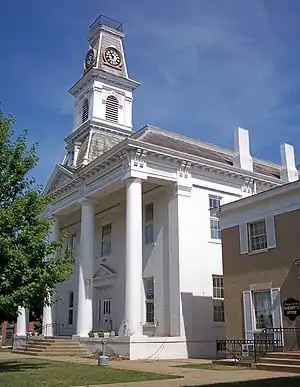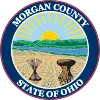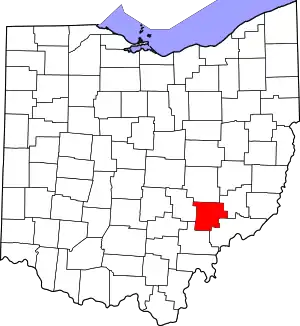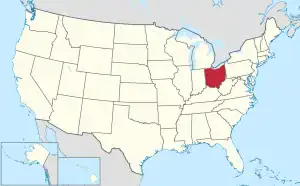Morgan County, Ohio
Morgan County is a county located in the U.S. state of Ohio. As of the 2020 census, the population was 13,802,[1] making it the third-least populous county in Ohio. Its county seat is McConnelsville.[2] The county was created in 1817 and later organized in 1819.[3] It is named for Daniel Morgan, an officer in the American Revolutionary War.[4]
Morgan County | |
|---|---|
 The Morgan County Courthouse in McConnelsville | |
 Seal | |
 Location within the U.S. state of Ohio | |
 Ohio's location within the U.S. | |
| Coordinates: 39°37′N 81°51′W | |
| Country | |
| State | |
| Founded | March 1, 1819 |
| Named for | Daniel Morgan |
| Seat | McConnelsville |
| Largest village | McConnelsville |
| Area | |
| • Total | 422 sq mi (1,090 km2) |
| • Land | 416 sq mi (1,080 km2) |
| • Water | 5.4 sq mi (14 km2) 1.3% |
| Population (2020) | |
| • Total | 13,802 |
| • Estimate (2021) | 13,682 |
| • Density | 33/sq mi (13/km2) |
| Time zone | UTC−5 (Eastern) |
| • Summer (DST) | UTC−4 (EDT) |
| Congressional district | 12th |
| Website | www |
History
Morgan County was formed on December 29, 1817, from portions of Guernsey, Muskingum and Washington counties. It was named after Daniel Morgan, a member in the Congress from Virginia, and general in the American Revolutionary War.
Geography
According to the United States Census Bureau, the county has a total area of 422 square miles (1,090 km2), of which 416 square miles (1,080 km2) is land and 5.4 square miles (14 km2) (1.3%) is water.[5]
Adjacent counties
- Muskingum County (north)
- Noble County (northeast)
- Washington County (southeast)
- Athens County (southwest)
- Perry County (west)
Public areas
Demographics
| Census | Pop. | Note | %± |
|---|---|---|---|
| 1820 | 5,297 | — | |
| 1830 | 11,800 | 122.8% | |
| 1840 | 20,852 | 76.7% | |
| 1850 | 28,585 | 37.1% | |
| 1860 | 22,119 | −22.6% | |
| 1870 | 20,363 | −7.9% | |
| 1880 | 20,072 | −1.4% | |
| 1890 | 19,143 | −4.6% | |
| 1900 | 17,905 | −6.5% | |
| 1910 | 16,097 | −10.1% | |
| 1920 | 14,555 | −9.6% | |
| 1930 | 13,583 | −6.7% | |
| 1940 | 14,227 | 4.7% | |
| 1950 | 12,836 | −9.8% | |
| 1960 | 12,747 | −0.7% | |
| 1970 | 12,375 | −2.9% | |
| 1980 | 14,241 | 15.1% | |
| 1990 | 14,194 | −0.3% | |
| 2000 | 14,897 | 5.0% | |
| 2010 | 15,054 | 1.1% | |
| 2020 | 13,802 | −8.3% | |
| 2021 (est.) | 13,682 | [6] | −0.9% |
| U.S. Decennial Census[7] 1790–1960[8] 1900–1990[9] 1990–2000[10] 2010–2020[1] | |||
2000 census
As of the census of 2000, there were 14,897 people, 5,890 households, and 4,176 families living in the county. The population density was 36 people per square mile (14 people/km2). There were 7,771 housing units at an average density of 19 units per square mile (7.3/km2). The racial makeup of the county was 93.66% White, 3.41% Black or African American, 0.35% Native American, 0.08% Asian, 0.26% from other races, and 2.24% from two or more races. 0.41% of the population were Hispanic or Latino of any race.
There were 5,890 households, out of which 30.90% had children under the age of 18 living with them, 56.90% were married couples living together, 9.90% had a female householder with no husband present, and 29.10% were non-families. 25.50% of all households were made up of individuals, and 12.00% had someone living alone who was 65 years of age or older. The average household size was 2.50 and the average family size was 2.98.
In the county, the population was spread out, with 25.30% under the age of 18, 7.80% from 18 to 24, 26.30% from 25 to 44, 25.00% from 45 to 64, and 15.60% who were 65 years of age or older. The median age was 39 years. For every 100 females there were 96.50 males. For every 100 females age 18 and over, there were 94.90 males.
The median income for a household in the county was $28,868, and the median income for a family was $34,973. Males had a median income of $30,411 versus $21,039 for females. The per capita income for the county was $13,967. About 15.70% of families and 18.40% of the population were below the poverty line, including 25.10% of those under age 18 and 12.40% of those age 65 or over.
2010 census
As of the 2010 United States census, there were 15,054 people, 6,034 households, and 4,140 families living in the county.[11] The population density was 36.2 inhabitants per square mile (14.0/km2). There were 7,892 housing units at an average density of 19.0 units per square mile (7.3 units/km2).[12] The racial makeup of the county was 93.2% white, 2.9% black or African American, 0.3% American Indian, 0.1% Asian, 0.2% from other races, and 3.3% from two or more races. Those of Hispanic or Latino origin made up 0.6% of the population.[11] In terms of ancestry, 21.2% were German, 12.9% were English, 12.7% were Irish, and 9.8% were American.[13]
Of the 6,034 households, 29.7% had children under the age of 18 living with them, 53.4% were married couples living together, 10.4% had a female householder with no husband present, 31.4% were non-families, and 26.3% of all households were made up of individuals. The average household size was 2.46 and the average family size was 2.94. The median age was 42.4 years.[11]
The median income for a household in the county was $34,962 and the median income for a family was $40,440. Males had a median income of $37,173 versus $30,176 for females. The per capita income for the county was $18,777. About 15.7% of families and 19.1% of the population were below the poverty line, including 25.2% of those under age 18 and 12.6% of those age 65 or over.[14]
Politics
Morgan County is a stronghold Republican county in presidential elections. The only Democratic presidential candidates to win the county were Woodrow Wilson in 1912 and Lyndon B. Johnson in 1964, but Bill Clinton came within 181 votes of carrying it in 1996.
| Year | Republican | Democratic | Third party | |||
|---|---|---|---|---|---|---|
| No. | % | No. | % | No. | % | |
| 2020 | 5,041 | 73.53% | 1,725 | 25.16% | 90 | 1.31% |
| 2016 | 4,431 | 68.41% | 1,736 | 26.80% | 310 | 4.79% |
| 2012 | 3,179 | 51.81% | 2,814 | 45.86% | 143 | 2.33% |
| 2008 | 3,440 | 51.96% | 2,966 | 44.80% | 214 | 3.23% |
| 2004 | 3,758 | 56.06% | 2,875 | 42.89% | 70 | 1.04% |
| 2000 | 3,451 | 57.58% | 2,261 | 37.73% | 281 | 4.69% |
| 1996 | 2,566 | 42.97% | 2,385 | 39.94% | 1,020 | 17.08% |
| 1992 | 2,719 | 40.54% | 2,402 | 35.81% | 1,586 | 23.65% |
| 1988 | 3,713 | 63.37% | 2,085 | 35.59% | 61 | 1.04% |
| 1984 | 3,994 | 67.66% | 1,868 | 31.64% | 41 | 0.69% |
| 1980 | 3,236 | 60.31% | 1,875 | 34.94% | 255 | 4.75% |
| 1976 | 2,971 | 51.14% | 2,727 | 46.94% | 111 | 1.91% |
| 1972 | 3,679 | 68.50% | 1,554 | 28.93% | 138 | 2.57% |
| 1968 | 3,030 | 57.51% | 1,789 | 33.95% | 450 | 8.54% |
| 1964 | 2,281 | 42.76% | 3,053 | 57.24% | 0 | 0.00% |
| 1960 | 4,424 | 70.82% | 1,823 | 29.18% | 0 | 0.00% |
| 1956 | 4,134 | 73.82% | 1,466 | 26.18% | 0 | 0.00% |
| 1952 | 4,303 | 71.94% | 1,678 | 28.06% | 0 | 0.00% |
| 1948 | 3,480 | 65.96% | 1,783 | 33.79% | 13 | 0.25% |
| 1944 | 4,309 | 72.13% | 1,665 | 27.87% | 0 | 0.00% |
| 1940 | 4,966 | 65.32% | 2,637 | 34.68% | 0 | 0.00% |
| 1936 | 4,630 | 59.35% | 3,093 | 39.65% | 78 | 1.00% |
| 1932 | 3,957 | 54.34% | 3,107 | 42.67% | 218 | 2.99% |
| 1928 | 4,359 | 75.09% | 1,397 | 24.07% | 49 | 0.84% |
| 1924 | 3,553 | 60.94% | 2,072 | 35.54% | 205 | 3.52% |
| 1920 | 4,127 | 64.26% | 2,157 | 33.59% | 138 | 2.15% |
| 1916 | 2,136 | 51.58% | 1,833 | 44.26% | 172 | 4.15% |
| 1912 | 1,448 | 35.70% | 1,633 | 40.26% | 975 | 24.04% |
| 1908 | 2,445 | 53.99% | 1,932 | 42.66% | 152 | 3.36% |
| 1904 | 2,572 | 58.79% | 1,612 | 36.85% | 191 | 4.37% |
| 1900 | 2,639 | 53.40% | 2,188 | 44.27% | 115 | 2.33% |
| 1896 | 2,531 | 51.12% | 2,375 | 47.97% | 45 | 0.91% |
| 1892 | 2,399 | 51.98% | 1,956 | 42.38% | 260 | 5.63% |
| 1888 | 2,531 | 53.97% | 1,974 | 42.09% | 185 | 3.94% |
| 1884 | 2,556 | 55.13% | 1,972 | 42.54% | 108 | 2.33% |
| 1880 | 2,510 | 53.11% | 2,091 | 44.24% | 125 | 2.64% |
| 1876 | 2,376 | 51.75% | 2,108 | 45.92% | 107 | 2.33% |
| 1872 | 2,339 | 58.23% | 1,551 | 38.61% | 127 | 3.16% |
| 1868 | 2,521 | 57.09% | 1,895 | 42.91% | 0 | 0.00% |
| 1864 | 2,601 | 60.14% | 1,724 | 39.86% | 0 | 0.00% |
| 1860 | 2,445 | 57.03% | 1,757 | 40.98% | 85 | 1.98% |
| 1856 | 2,125 | 53.19% | 1,669 | 41.78% | 201 | 5.03% |
Communities

Villages
- Chesterhill
- Malta
- McConnelsville (county seat)
- Stockport
Townships
Census-designated place
Unincorporated communities
References
- "State & County QuickFacts". United States Census Bureau. Retrieved October 21, 2022.
- "Find a County". National Association of Counties. Archived from the original on May 31, 2011. Retrieved June 7, 2011.
- "Ohio: Individual County Chronologies". Ohio Atlas of Historical County Boundaries. The Newberry Library. 2007. Archived from the original on April 6, 2016. Retrieved February 14, 2015.
- "Morgan County data". Ohio State University Extension Data Center. Retrieved April 28, 2007.
- "2010 Census Gazetteer Files". United States Census Bureau. August 22, 2012. Archived from the original on May 4, 2014. Retrieved February 9, 2015.
- "Annual Estimates of the Resident Population for Counties: April 1, 2020 to July 1, 2021". Retrieved October 21, 2022.
- "U.S. Decennial Census". United States Census Bureau. Retrieved February 9, 2015.
- "Historical Census Browser". University of Virginia Library. Retrieved February 9, 2015.
- Forstall, Richard L., ed. (March 27, 1995). "Population of Counties by Decennial Census: 1900 to 1990". United States Census Bureau. Retrieved February 9, 2015.
- "Census 2000 PHC-T-4. Ranking Tables for Counties: 1990 and 2000" (PDF). United States Census Bureau. April 2, 2001. Archived (PDF) from the original on March 27, 2010. Retrieved February 9, 2015.
- "DP-1 Profile of General Population and Housing Characteristics: 2010 Demographic Profile Data". United States Census Bureau. Archived from the original on February 13, 2020. Retrieved December 27, 2015.
- "Population, Housing Units, Area, and Density: 2010 - County". United States Census Bureau. Archived from the original on February 13, 2020. Retrieved December 27, 2015.
- "DP02 SELECTED SOCIAL CHARACTERISTICS IN THE UNITED STATES – 2006-2010 American Community Survey 5-Year Estimates". United States Census Bureau. Archived from the original on February 13, 2020. Retrieved December 27, 2015.
- "DP03 SELECTED ECONOMIC CHARACTERISTICS – 2006-2010 American Community Survey 5-Year Estimates". United States Census Bureau. Archived from the original on February 13, 2020. Retrieved December 27, 2015.
- Leip, David. "Dave Leip's Atlas of U.S. Presidential Elections". uselectionatlas.org. Retrieved May 2, 2018.
Further reading
- Thomas William Lewis, History of Southeastern Ohio and the Muskingum Valley, 1788-1928. In Three Volumes. Chicago: S.J. Clarke Publishing Co., 1928.